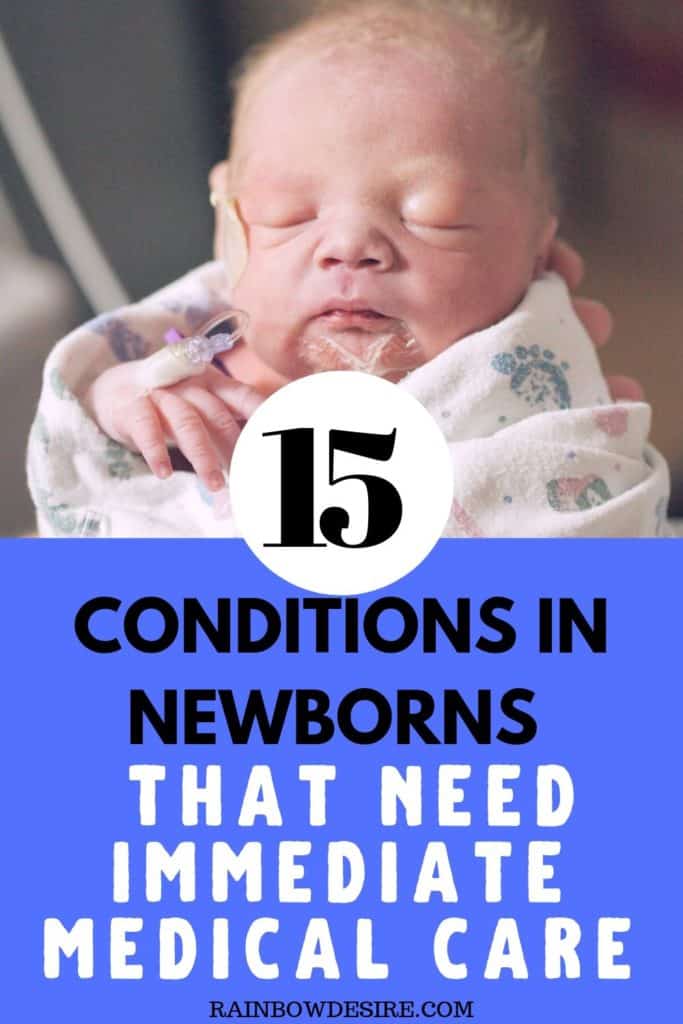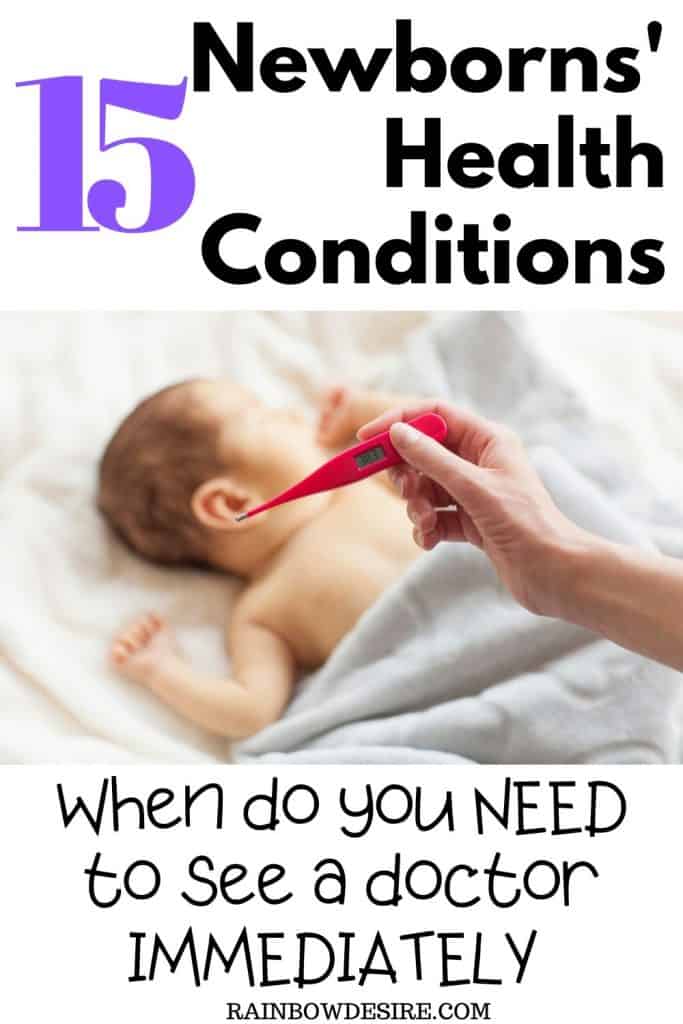During the baby’s first year, you may experience frequent visits to the doctor’s office. Most of these doctor’s visits are routine physical checkup for the baby’s first year, which is scheduled once a week and then monthly as your baby starts growing older while some may have been due to a random newborn thing which tends to go away on its own. However, in some health conditions, newborns need immediate medical care.
Newborns transition from cozy and comfy womb to this world full of challenges when they are ready in most cases. Giving them time to adjust to a new environment, their bodies may experience conditions that go away on their own. Minor cold, flu, diarrhea may take a day or two to get better. Call your doctor’s office and let on-call nurse guide you with some help until you get to see the provider.
While some conditions may seem common in many circumstances and go away on their own, this does not mean you should not be concerned about certain medical situations that require immediate attention.
I am not a doctor or giving professional advice to any mom. I am just a mom who is trying to help other moms to be aware and not to be worried.
Newborn health conditions that require immediate medical care
Here are the medical conditions of newborns that need immediate evaluation by the doctor to find out what’s going on.
1. Thrush
Thrush is a condition when your newborn develops a white coating inside the mouth, which is the yeast that lives in the intestinal tract and responsible for diaper rashes as well.
For many cases, thrush may go away on its own but you have to talk to your doctor to get a right evaluation for the nature and severity of thrush.
Thrush tends to spread and keep coming back, thus, your health care provider can decide to see what treatment to choose.
2. Tongue tie
We all are born with tongue tie. It is the tissue that attaches a tongue with floor or our mouth. However, some babies have that attachment too much extended to the tip of the tongue. Usually babies with tongue tie do not require treatment because it is fixed on its own. Babies who have tongue tie have trouble latching while breastfeeding.
For some babies doctors may suggest an office procedure to treat tongue tie.
Learn more about baby’s head handling.
3. Rashes
Babies having rashes on the diaper area is quite common. These rashes usually go away by using diaper cream and keeping the surface clean. Unfortunately, some, if not all, rashes become a pain, and they do not go away on their own or with creams. That may be a sign of yeast infection. In that case, schedule an appointment with your child’s pediatrician.
Effective remedies to treat baby diaper rash.
4. Umbilical infections, oozing or bleeding
Typically, the umbilical cord comes off no later than five weeks. No matter if it comes off, you still have to keep a close eye on the skin to see any signs of oozing yellow discharge or blood. If you notice any redness, warmth, foul smell, swelling, and tenderness, there is a risk of infection.
Your provider may recommend you a topical medication to treat infections.
In rare cases, an oversized belly button could be a cause of hernia in babies. Talk to your doctor if you notice such things even after umbilical cord is detached.
Newborn Care mistakes new moms must avoid.
5. Blocked tear duct and pink eye
Babies tear duct is located in the inner corner of their eye that supports drainage. These tea ducts open in a few months after the baby is born. However, for some babies, it may take almost a year.
If your little one’s tear duct gets blocked meaning you do not see your baby shedding tears, or you notice any sign of infection, you need to call your child’s pediatrician.
Read more about newborns face handling after birth.
6. Sunken fontanelles
Although fontanelles seem very pulsating and soft, you still have to keep an eye. If the baby is not getting regular on eating and have dry diapers in addition to fontanelles appear sunken in the baby’s head. It could be a sign of severe dehydration.
This needs immediate evaluation from the doctor.
Keep in mind If your baby is not having enough wet diapers or you notice them yellow or orange colored pee, you need to call the doctor’s office or seek medical help.
7. Flat spots on head due to back sleeping
Babies tend to develop flat spots on the back of the head or the side. Baby’s head may seem asymmetrical or slanted from one side. This is called fat head syndrome.
If you notice flat spots on babies head due to too much back sleeping ( meaning no tummy time), you need to talk to your doctor about it or she may notice on your baby’s regular physical checkup.
The pediatrician may have to recommend helmet therapy if it is necessary. For mild cases flipping sides can also help.
Using some head shaping pillows to prevent flat head can help significantly.
Read more
Mommy mistakes with newborns every new mom should know.
New mom hacks with newborn care.
8. Frequent vomiting after consecutive 2 or more feedings
Spitting up is normal in newborns although it may seem your baby threw up everything all together. If your baby is vomiting on random occasions it may be her esophageal muscles are not strong enough to keep food inside. baby’s muscles get stronger as they grow older. spitting up will significantly improve in about 5 to 6 months.
However, if your baby is vomiting after every 2 or 3 feedings or more in a row, then you need to see your provider because it is a sign of something serious.
Read more
Baby’s is throwing up too much – what are the reasons to deal with frequent spit-ups.
9. Gerd – gastroesophageal reflux disease more like heartburn
If your baby seems to have GERD, a reflux disease when a baby feels like heartburn after eating something or have trouble digesting milk.
You need to see a doctor to get a right diagnosis.
Why do babies have reflux issues.
10. Baby getting blue
There is a chance; sometimes babies seem blue in some areas on their bodies than usual, that means there is no supply of oxygen to those areas.
In such situations, you need to be extra vigilant and follow your instinct. If something seems wrong with a baby you need to go to emergency care right away.
11. Smelly vaginal discharge
Some baby girls, if not all, may have vaginal discharge in the earlier days after birth. This is another typical scenario. However, if the discharge by any chance turns yellow or green or develops an odor, then you need to get this evaluation.
12. Hernia in boys
Boys who are born prematurely are more likely to develop a hernia. A hernia is a swelling in the scrotum area of boys. If you notice something similar, do not hesitate to call your doctor and get it evaluated immediately.
13. Fever even not higher than 100.
If your baby has a fever in the first few months after birth, then you always make sure that you bring it to your doctor’s attention. The temperature may go away on its own, but it is still a good thing to talk to your doctor.
Fever more than 100.4 degrees, you have to see your pediatrician.
How to treat cold and flu in babies.
Baby’s sick days medical kit you must have in your cabinet.
14. Jaundice not going away
Jaundice in babies is common who do not share the same blood type with their moms. Although jaundice may take time (several weeks) to go, it should be getting better every day. Having your baby get some indirect sunlight is an effective treatment.
However, if you notice the yellowish tone is increasing inside the eyes, skin, or tongue then this requires a doctor’s evaluation.
15. Rigid and Curved arms and legs
Babies are born with curved arms and legs as they have been curled up for good 9 months. Newborn babies have soft bones and they straightened out with time over a year on their own.
However, if you feel your baby’s legs are getting rigid and not straightening out, then you need to see your doctor for a thorough evaluation.
Some other conditions may involve severe dehydration meaning no significant amount of wet diapers or fall off from furniture like bed, changing station, sofa, etc. In very rare cases, seizures need immediate care.
Motherhood gives mom very strong instincts to know something seems wrong with the baby. Do not hesitate to call your doctor and discuss your concerns about your baby.






